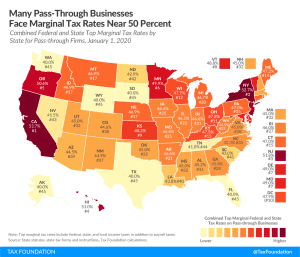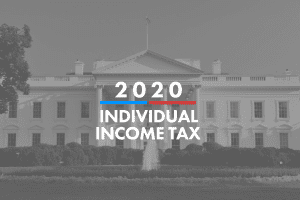
Garrett Watson is Director of Policy Analysis at the Tax Foundation, where he conducts research on federal and state tax policy. His work has been featured in The Washington Post, The Atlantic, Politico, the Associated Press and other major outlets.
Previously, Garrett was a program manager at a nearby think tank and conducted policy research on economic opportunity and labor markets, including non-compete clause reform.
Garrett earned a bachelor’s degree from St. Lawrence University in upstate New York, where he studied economics and philosophy. Garrett lives in northwest Arkansas and is an avid hockey fan and snowboarder.
Latest Work


Biden’s Plan to Boost Research and Development Should Include Cancellation of Upcoming R&D Amortization
As concern over American competitiveness and onshoring of innovative activity increases, presidential candidates and policymakers should keep in mind the tax increases scheduled to take effect in the coming years, including the amortization of R&D and phaseout of the broader expensing provisions.
3 min read
FAQ on Neutral Cost Recovery and Expensing
Cost recovery is the way the tax code permits firms to recover (or deduct) the cost of making investments. Cost recovery plays an important role in defining a business’ taxable income and can impact investment decisions.

National Taxpayer Advocate’s Report Is a Road Map to Simpler Pandemic Relief Provisions
The size and scope of the tax changes within the CARES Act created significant administrative challenges for the IRS. Lawmakers should prioritize simplicity in the next round of relief.
3 min read
Economic Analysis of Financing Options for Infrastructure Spending Proposals
Our analysis shows that the economic benefits of federal investment in productivity-enhancing infrastructure may be undercut by the negative effects of the financing of those investments, such as when the corporate income tax is increased.
6 min read
Weighing the Benefits of Permitting Business Credit Cashouts in Phase 4 Economic Relief
As lawmakers explore options for “Phase 4” coronavirus relief legislation, one idea that has received renewed attention is allowing businesses to cash out business tax credits. This proposal would be strengthened by also permitting acceleration of firms’ accrued net operating loss (NOL) deductions and designing the proposal so that firms can quickly convert these tax assets into cash.
4 min read
Watch: Economic Recovery After Coronavirus
What are the best tax policies to encourage a smooth transition and strong economic recovery? How should goals of economic recovery and growth be balanced with revenue needs?
1 min read
Net Operating Loss Carrybacks Are a Vital Source of Tax Relief for Struggling Firms in the Coronavirus Crisis
Rather than find ways to restrict net operating loss (NOL) carrybacks, lawmakers should focus on ways to improve liquidity by cashing out accrued NOLs, which would benefit startups and new small businesses without taxable income to offset in prior years.
3 min read
HEROES Act First Bid to Provide Phase 4 Relief for Businesses and Individuals
The HEROES Act, the $3 trillion relief package proposed by House Democrats, is the first bid to provide additional phase 4 aid for businesses and individuals amid the coronavirus pandemic.
7 min read
The U.S. Tax Burden on Labor, 2020
Although the U.S. has a progressive tax system and a relatively low tax burden compared to the OECD average, average-wage workers still pay about 30 percent of their wages in taxes.
15 min read
Advancing Net Operating Loss Deductions in Phase 4 Business Relief
Policymakers will have to consider design options for accelerating NOL deductions to ensure the refunds are simple, provide targeted relief to struggling firms, and are consistent with long-run revenue needs.
17 min read
Senate Passes Additional Funding for Small Business Relief, But Questions Remain on the Deductibility of PPP Expenses
The sooner federal policymakers or regulators clarify tax questions about the Paycheck Protection Program (PPP), the more certainty firms will have when they accept the economic relief to keep their businesses afloat.
3 min read
A Review of Net Operating Loss Tax Provisions in the CARES Act and Next Steps for Phase 4 Relief
In addition to providing economic relief to individuals and loans to businesses struggling during the coronavirus crisis, the CARES Act changed several tax provisions to increase liquidity to ensure firms survive a large decline in cash flow.
7 min read
Federal Coronavirus Relief: CARES Act FAQ
Congress recently passed the largest economic relief bill in American history (CARES Act). We’ve created a FAQ portal to better inform policymakers, journalists, and taxpayers across the country on the new law.
13 min read
A History and Analysis of Payroll Tax Holidays
As Congress and the White House consider ways to shore up the economy in the face of a public health crisis, President Trump has suggested suspending the entire payroll tax for the duration of the year. That would cost about $950 billion, according to our analysis.
6 min read
Congress Approves Economic Relief Plan for Individuals and Businesses
The CARES Act, now signed into law, is intended to be a third round of federal government support in the wake of the coronavirus public health crisis and associated economic fallout, following the $8.3 billion in public health support passed two weeks ago and the Families First Coronavirus Response Act.
10 min read
Review and Analysis of House Democrats Coronavirus Response Bill
The proposed Take Responsibility for Workers and Families Act can be contrasted with the Senate Republican CARES Act, although they share some similarities by providing individual taxpayers with a rebate and modifying business tax provisions to provide liquidity for struggling firms.
5 min read
Tax Options for Economic Relief During the Coronavirus Crisis
Instead of simply reaching for fiscal stimulus with the goal of increasing economic activity, tax policy changes can give vulnerable individuals and businesses additional liquidity and space to survive the reduction in economic activity needed in light of the coronavirus outbreak.
5 min read

Analysis of Democratic Presidential Candidate Individual Income Tax Proposals
Joe Biden and Bernie Sanders have each proposed changes to the individual income tax, one of the largest sources of federal revenue. Our new analysis compares the economic, revenue, and distributional effects of the various proposals.
13 min read